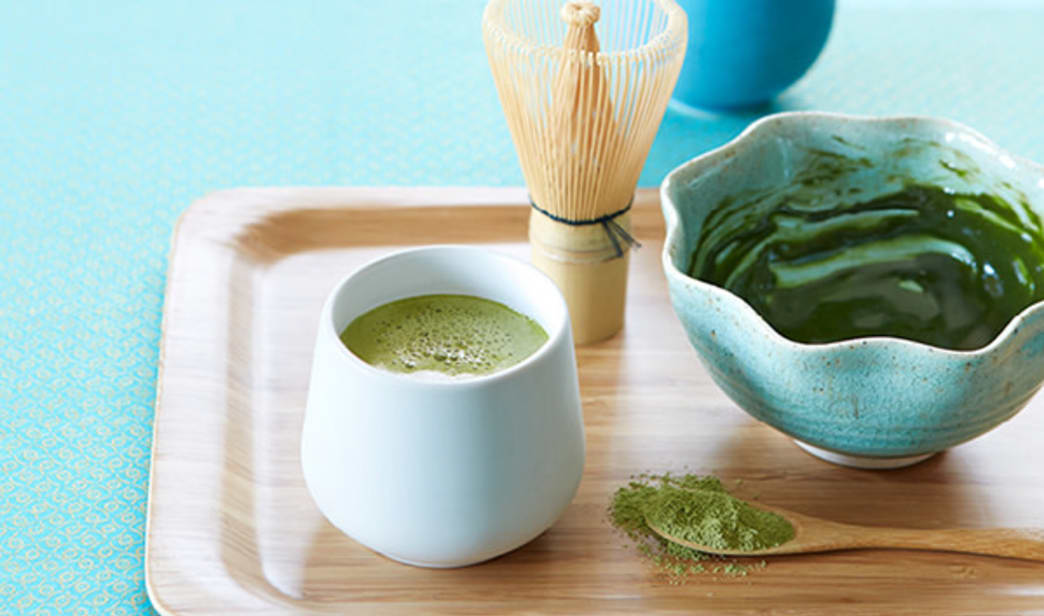The Difference Between Matcha and Green Tea

Matcha enhances energy and delivers concentrated antioxidants and other nutrients without the jittery side effects.
If the matcha craze hasn't reached your neighborhood yet, you may well be wondering what it is. A traditional Japanese ceremonial drink, matcha is a type of green tea that is grown and prepared like no other. It enhances energy and delivers concentrated antioxidants and other beneficial nutrients without jittery side effects.
What Is Matcha?
In most teas, the leaves are steeped in water and then discarded, but with matcha, green tea leaves are ground into a fine powder that actually dissolves in the water. So when you drink matcha, you consume the mixture of water and tea leaf powder, which is the source of matcha's potent nutritional benefits.
As with other plants, the nutrients in tea are influenced by the environment where the tea is grown. For matcha, the green tea is grown in shaded areas, which gives it a bright green color and higher levels of detoxifying chlorophyll and other nutrients.
Compared to regular green teas, matcha contains at least three times the amount of EGCG, considered the key beneficial antioxidant in green tea, according to research at the University of Colorado at Colorado Springs. Published in the Journal of Chromatography A, the study found that levels of EGCG were 137 times higher in matcha compared to one popular brand of green tea.
Brimming with Healthy Benefits
Studies of green tea have shown that it:
- Promotes heart health by mildly lowering cholesterol, making blood less sticky, and protecting arteries.
- Reduces skin damage from the sun.
- Protects against certain cancers.
- Improves the balance of gut bacteria.
- Protects against liver damage.
- Fortifies the immune system.
- Improves mental function.
- Helps lower blood pressure.
- May help with weight loss.
- Energy without Jitters
Matcha fans report sustained energy and alertness without the jitters associated with coffee-likely because the caffeine in matcha is offset by theanine, a calming amino acid. Studies of theanine show that it reduces the effects of stress without causing drowsiness during the day, and enhances sleep at night. Levels of caffeine vary from one matcha to another, with estimates per cup ranging between 25 mg-less than other teas- to about 70 mg-nearly as much as a cup of coffee.
Did You Know?
Compared to regular green teas, matcha contains 3-137 times as much EGCG, a key antioxidant with health-promoting properties.
How to Make Matcha
Traditionally prepared with about 2 ounces of water and whisked to a frothy consistency, matcha can also be made with more water.
Traditional utensils: small sifter, bamboo whisk, ceramic bowl.
If you don't have a bamboo whisk, any small whisk or a small milk frother will do.
Ingredients to make 1 serving:
½-1 tsp. matcha
2-8 oz. of filtered or spring water
Heat water to boil, remove from heat, and let it rest for a few minutes so that it's hot but no longer boiling. The ideal water temperature is around 175°F. Sift or place matcha into the bottom of the bowl. Add about 1 tablespoon of hot water and whisk into a smooth paste, using a zigzag motion. Add remaining water and whisk to a smooth, frothy consistency. Drink out of the bowl.
Other Options:
- Instead of whisking, stir with a spoon (it won't be frothy).
- Add your favorite sweetener.
- For cappuccino-style matcha, use about 2 ounces of water, froth or stir, and then add frothed milk.
- For iced matcha, make it with 2 ounces of water and pour into a glass filled with ice.
Written by vera-tweed for Better Nutrition and legally licensed through the Matcha publisher network. Please direct all licensing questions to legal@getmatcha.com.





